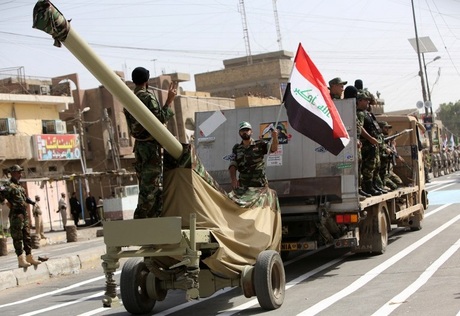Iraq PM Pushes Political Solution as Forces Launch Helicopter-Borne Assault on Tikrit
إقرأ هذا الخبر بالعربية
Prime Minister Nuri al-Maliki conceded Thursday that political measures are needed alongside military action to repel a Sunni insurgent offensive that is threatening to tear Iraq apart.
He spoke as British Foreign Secretary William Hague urged Iraqi leaders to unite in the face of the onslaught, led by the Islamic State of Iraq and the Levant (ISIL), that has killed nearly 1,100 people and displaced more than half a million more.
Iraqi forces launched a helicopter-borne assault aimed at opening the way to retaking militant-held Tikrit, while the autonomous Kurdish region further staked its claim to the disputed city of Kirkuk.
Powerful Shiite cleric Moqtada al-Sadr meanwhile risked ratcheting up already-high sectarian tensions by vowing to "shake the ground" under the feet of the advancing militants.
Later on Thursday, a suicide bomb in a predominantly Shiite area of Baghdad killed 19 people.
"We should proceed in two parallel tracks," Maliki told Hague, on a surprise visit to Iraq.
Along with military operations, authorities must continue "following up on the political process and holding a meeting of the parliament (on time) and electing a head of parliament and a president and forming the government."
Thus far, Maliki had publicly focused on a military response to the two-week crisis, and his latest comments were his clearest yet regarding finding a political solution.
In an interview with the BBC, Maliki said the Syrian air force had carried out strikes against militants on the Syrian side of the Al-Qaim border crossing, controlled by ISIL.
He added that Iraq had purchased several used Sukhoi fighter jets from Belarus and Russia.
Maliki said Baghdad had not requested the Syrian strikes, but he "welcomed" any such move against the ISIL-led militants.
But the United States later said that Syrian military action would not be "in any way helpful to Iraq's security," but that Iran "could play a constructive role" if it promoted an inclusive Iraqi government.
Iraq has appealed for U.S. air strikes against the militants, but Washington has only offered up to 300 military advisers, the first of whom have begun work in Baghdad.
On Thursday, Iraqi forces swooped into Tikrit by helicopter, taking control of a strategically located university after clashes with militants, officials said.
A senior army officer said the assault on Tikrit, which has been held by militants since June 11, would open the way for the city and surrounding areas to be retaken.
Washington has urged Iraq's fractious leaders to unite in the face of the militants, and Hague echoed that message Thursday, saying the "urgent priority must be to form an inclusive government."
"It is vital to demonstrate to the world that Iraq is uniting in the face of this threat," he said after meeting Iraqi leaders. "This is the best way to receive international support."
Washington has stopped short of calling for Maliki to go, but has left little doubt it feels he has squandered the opportunity to rebuild Iraq since American troops withdrew in 2011.
In a televised speech from the Shiite shrine city of Najaf, powerful cleric Sadr vowed to "shake the ground" under the feet of the militants.
He said foreign powers "and especially forces of the occupier and regional states should take their hands off" the country, referring to the United States and Iraq's neighbors.
But in an apparent effort to restrain worsening sectarian tensions, Sadr insisted that the militants did not represent Iraqi Sunnis, whom he said had suffered "marginalization and exclusion."
Potentially worsening communal ties, a suicide attack in Kadhimiyah, a north Baghdad neighborhood that is home to the shrine of a revered Shiite figure, killed 19 people.
Iraq's flagging security forces were swept aside by the initial insurgent push, but have since begun regrouping, although they have yet to take back control of major cities lost to the militants.
Loyalists forces pulled out of several ethnically divided areas of Iraq, including northern oil hub Kirkuk. That enabled Iraqi Kurds to take de facto control of areas they have long wanted to incorporate into their autonomous region, over Baghdad's strong objections.
Kurdish regional president Barzani toured Kirkuk Thursday, in his first visit since the takeover, to inspect forces deployed to defend the city against militants to the west and south.
Meanwhile ISIL fighters bolstered their presence Thursday in the Syrian town of Albu Kamal on the border with Iraq, a Syrian monitoring group said.
Maliki's security spokesman has said hundreds of soldiers have been killed since the offensive began, while the U.N. puts the overall number of people killed at nearly 1,100.
only solution is political, iraqi constitution gives same rights to all confessions, lets apply it...
Saddam knew how to deal with khomeynists, traitors and iranian lackeys...
he was a criminal but died like a man, killed by shias hiding their face like women...



